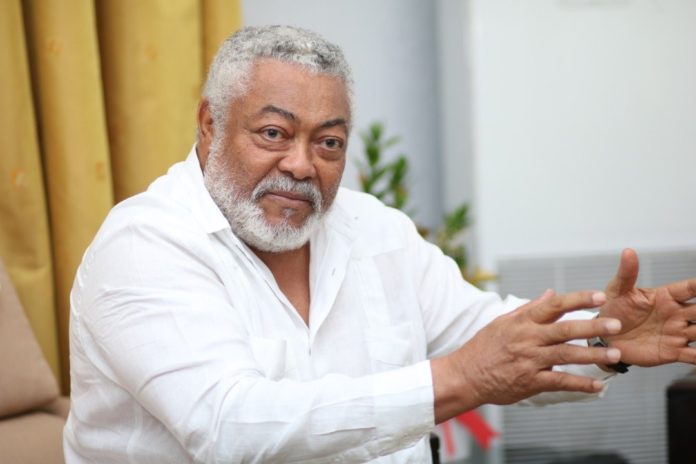Ghana’s former President Jerry John Rawlings has died at the age of 73.
He came to political prominence on the back of two coups, in 1979 and 1989, before twice being elected president after Ghana’s subsequent return to civilian rule.
Mr. Rawlings’ family confirmed his Thursday morning death which was “after a short illness.”
In a statement, Ghana’s president, Nana Akufo-Addo, led tributes saying: “a great tree has fallen and Ghana is poorer for this loss.”
The president also directed seven days of national mourning during which all flags are to fly at half-mast.
Tributes for Mr. Rawlings also came from key figures on the African continent.
“The entire African continent will sorely miss the sterling qualities of the great leader,” Nigeria President Muhammadu Buhari said in a statement.
“Ghana, Liberia and Africa will miss a great leader,” Liberia President George Weah, tweeted. “Liberia remembers his immense contribution to the attainment and sustainment of peace during the dark days of our own history.”
“Africa has lost a stalwart of pan-Africanism and a charismatic continental statesman,” the AU Commission chair, Moussa Faki, also said on Twitter.
Mr. Rawlings’ death comes with less than a month to Ghana’s general election which will see the party he founded, the National Democratic Congress, come up against the governing New Patriotic Party; the former led by former President John Mahama and the latter led by President Akufo-Addo.
There are also 10 other candidates from smaller parties vying for the presidency including Mr. Rawlings’ wife, Nana Konadu Agyeman-Rawlings.
Rawlings’ Complicated Legacy
Reaction from citizens on social media highlighted the complicated political figure that was Mr. Rawlings.
Whilst there has been an overwhelming outpouring of grief, there were reminders about scars Mr. Rawlings left on the nation during his about-two decades of rule.
“It is forbidden to speak ill of the dead in our culture. It is, however, acceptable to say the truth about the dead,” prominent Ghanaian journalist, Nana Ama Agyemang Asante tweeted.
“JJ [Rawlings] came in 1979 – 40 years ago. Most of his fans are under 50, and never saw the terror. Or experienced the hard times he supposedly came to upend. So they can celebrate the recycled versions. Yes, he was complicated and yes folks who lost loved ones won’t be crying,” academic and lecturer Akosua Adomako Ampofo also noted.
I have nothing good to say about Jerry John Rawlings. He never showed any remorse for the abuses and killings carried out on his watch, or for failing to root out the corruption he claimed was justification for said abuses and killings.
— Soraya 🇬🇭 (@SorayaSpeaks) November 12, 2020
Mr. Rawlings’ first successful coup, regarded in Ghana as the June 4 uprising, saw eight senior military officers, including three former heads of state; Akwasi Afrifa, Ignatius Acheampong, and Frederick Akuffo executed amid claims of corruption and mismanagement against them.
General Akuffo had foiled an earlier coup attempt by Mr. Rawlings in May 1979 and jailed him.
Within a month, however, Mr. Rawlings was freed by fellow junior officers and quickly took charge of the Government in the uprising.
Mr. Rawlings, then a Flight Lieutenant, held fast to his pledge to ensure democratic rule, which followed shortly under President Hilla Limann who assumed office on September 24, 1979
Democracy was shortlived, however, with Mr. Rawlings’ second coup taking place on December 31, 1981.
”They were a pack of criminals who bled Ghana to the bone,” a 34-year-old Rawlings, said of the Limann administration whilst vowing to “clean up corruption.”
Mr. Rawlings also felt he had the backing of Ghanaians, who were in the midst of economic hardship.
”I am prepared at this moment to face a firing squad if what I try to do for the second time in my life does not meet the approval of Ghanaians,” he said in his speech marking the coup.
In the early years of his junta, Mr. Rawlings notably held on to leftwing policies of communist nations like the Soviet Union and Cuba.
But he eventually turned to the free market to breathe life into Ghana’s struggling economy.
Critics tagged his embracing of a neoliberal structural adjustment reform as him comprising and selling out of his early socialist ideals.
For a lot of Ghanaians at the time, Mr. Rawlings was synonymous with pure charisma, empathy for the working class, and a raging contempt for graft.
For his critics, however, Mr. Rawlings’ military takeovers were defined by authoritarian rule and human rights abuses.
The abduction and murder of three High Court judges remain one of the deepest scars from the Rawlings junta.
The three slain judges had notably reviewed cases of the Armed Forces Revolutionary Council, the first Rawlings junta.
As the Chairman of the Provisional National Defence Council (PNDC), Mr. Rawlings would steer Ghana under joint military and civilian rule until January 1993, when he sworn-in as President after winning Ghana’s first democratic polls since 1979.
Mr. Rawlings is seen as laying the foundation for one of Africa’s most stable democracies, solidified by him peacefully handing over power to John Kufour, of the opposition party, in 2001.

